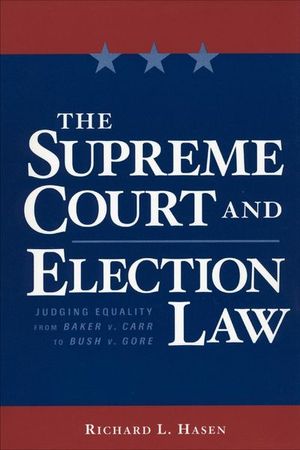The Supreme Court and Election Law
Published by NYU Press
“A pioneering study of the Court’s increasing efforts to regulate the US political system” from the author of A Real Right to Vote (Bruce Cain, University of California, Berkeley).
In the first comprehensive study of election law since the Supreme Court decided Bush v. Gore, Richard L. Hasen rethinks the Court’s role in regulating elections. Drawing on the case files of the Warren, Burger, and Rehnquist courts, Hasen roots the Court’s intervention in political process cases to the landmark 1962 case, Baker v. Carr. The case opened the courts to a variety of election law disputes, to the point that the courts now control and direct major aspects of the American electoral process.
The Supreme Court does have a crucial role to play in protecting a socially constructed “core” of political equality principles, contends Hasen, but it should leave contested questions of political equality to the political process itself. Under this standard, many of the Court’s most important election law cases from Baker to Bush have been wrongly decided.
“A must-read for anyone interested in the intersection of law and politics . . . [Hasen’s] is an important framework against which election law scholars will react and upon which they will build for some time to come.” —Michigan Law Review
“Hasen engagingly draws on internal Court deliberations, as well as political science and legal theory, to assess and criticize dramatic transformations in the role of constitutional law in overseeing the structure of democracy.” —Richard H. Pildes, NYU School of Law
“A major contribution to the field of election law.” —Thomas E. Mann, The Brookings Institution
BUY NOW FROM
COMMUNITY REVIEWS

